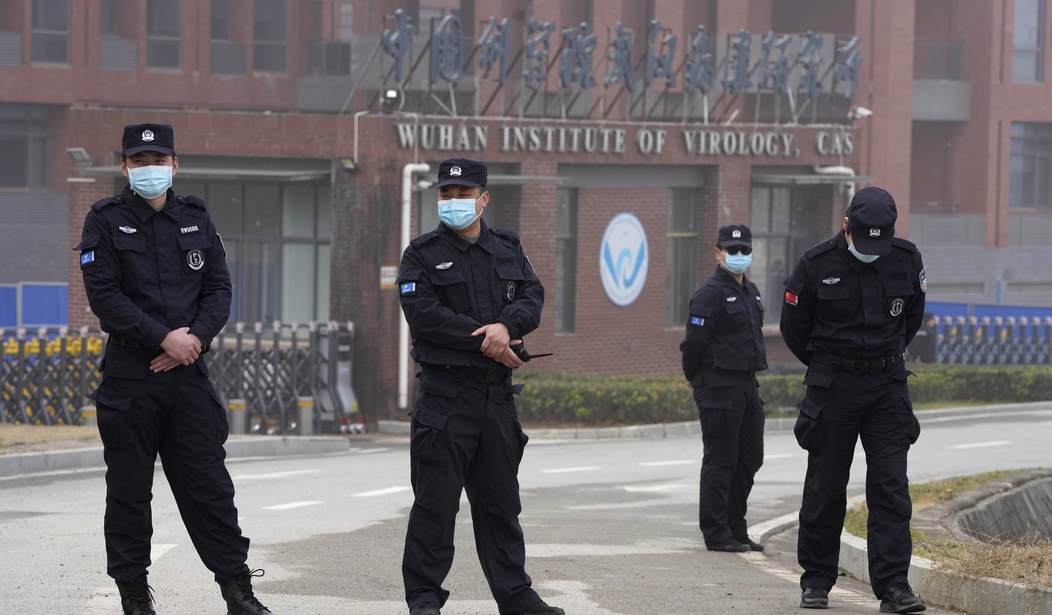Last week, the U.S. Senate unanimously voted to cut taxpayer funding for the Wuhan Institute of Virology (WIV) and the Biden Administration ordered an investigation into COVID’s origins, including whether it resulted from a lab accident. It’s about time.
A little over a year ago in Townhall, I wrote about how “a federal grant funded dangerous virus experiments at the Wuhan Institute of Virology, the bio-agent lab suspected as an origin for coronavirus. This is especially concerning because in 2018, the U.S. Department of State visited the facility and warned that its practices could cause a pandemic.”
That piece followed an exposé by the tenacious taxpayer watchdog White Coat Waste Project revealing that U.S. taxpayer money from Anthony Fauci’s division at the National Institutes of Health (NIH) did, in fact, provide funding to programs within the Wuhan lab. The funds were used to capture wild coronavirus-infected bats, bring them back to the lab, and conduct animal experiments to manipulate the coronaviruses in order to infect so-called “humanized” mice and human cells.
Alarming as this was, at the time, the lab leak hypothesis was still being unduly dismissed by countless “journalists” and empty suits as a conspiracy theory. A year later, the idea is fully mainstreamed and top scientists—surprisingly, even the Biden Administration—now consider it a leading hypothesis for the cause of the COVID outbreak.
WIV was manipulating coronaviruses to make them more contagious to animals and humans, known now more widely to the public as “gain of function” research. The lab houses one of the largest collections of coronaviruses in the world, including one that’s 96% similar to SARS-CoV-2, the virus that caused the pandemic. And the State Department warned in 2017 and 2018 that lax safety protocols at WIV presented a pandemic risk.
Recommended
As former Food and Drug Administration Commissioner Dr. Scott Gottlieb tweeted, “By assembling a large repository of dangerous coronaviruses into a single lab in a densely populated city, and experimenting on animals, Chinese researchers greatly increased the risk of a lab leak.”
Additionally, last month, the Wall Street Journal reported that three WIV lab workers were hospitalized with COVID-like symptoms in the fall of 2019. According to a former State Department investigator, the wife of a WIV researcher died in December 2019 from a COVID-like illness.
Despite all of the mounting circumstantial evidence, for over a year Anthony Fauci publicly dismissed the leak at the CCP-run lab as a possibility, even literally laughing it off in some cases. But under pressure from Congress and legitimate questions from serious reporters, he’s finally acknowledged it's possible.
His evasionary behavior is inexcusable, but one can understand why Fauci would downplay the lab leak hypothesis. As former New York Times reporter Nicholas Wade recently wrote, “If the SARS2 virus did indeed escape from [the Wuhan] lab, the National Institutes of Health (NIH) will be in the unenviable position of having funded research that has killed 3 million people worldwide.”
For a global event of this magnitude, momentum to test the lab leak hypothesis is on the side of Senate Republicans like Sen. Joni Ernst (R-IA) who have introduced bills to declassify intelligence related to the lab leak, and there are now bipartisan calls from the House Energy and Commerce Committee—which has oversight authority over the NIH—to investigate a potential lab leak.
You don’t need a Ph.D. to understand the viability of the lab leak hypothesis. And it’s just that, a hypothesis, “A supposition or proposed explanation made on the basis of limited evidence as a starting point for further investigation.”
But in today’s America, the greatest contributor to and champion of scientific advancements in human history, even hypothesizing outside the lens of a homogenous and woke political agenda is cause for cancelation. Doing so causes us to dismiss the foundation of the scientific method and the core of critical thinking. Without the freedom to hypothesize, we extinguish the very thing that allows us to imagine a better future - because a better future starts by solving today’s problems, and today’s problems require us to hypothesize multiple solutions taken with the information at-hand and test them out.
Preventing another manmade pandemic obviously requires us to know how this one started. And our taxpayers have a right to know if government bureaucrats placed global health in peril by shipping our tax dollars to a shoddy lab in China with a record of carelessness. And as important as that is, the mere act of asking questions based on evidence cannot be villainized. Doing so would put us on a corrosive path unakin to our values and equally as damaging, albeit slower, than another pandemic.























Join the conversation as a VIP Member